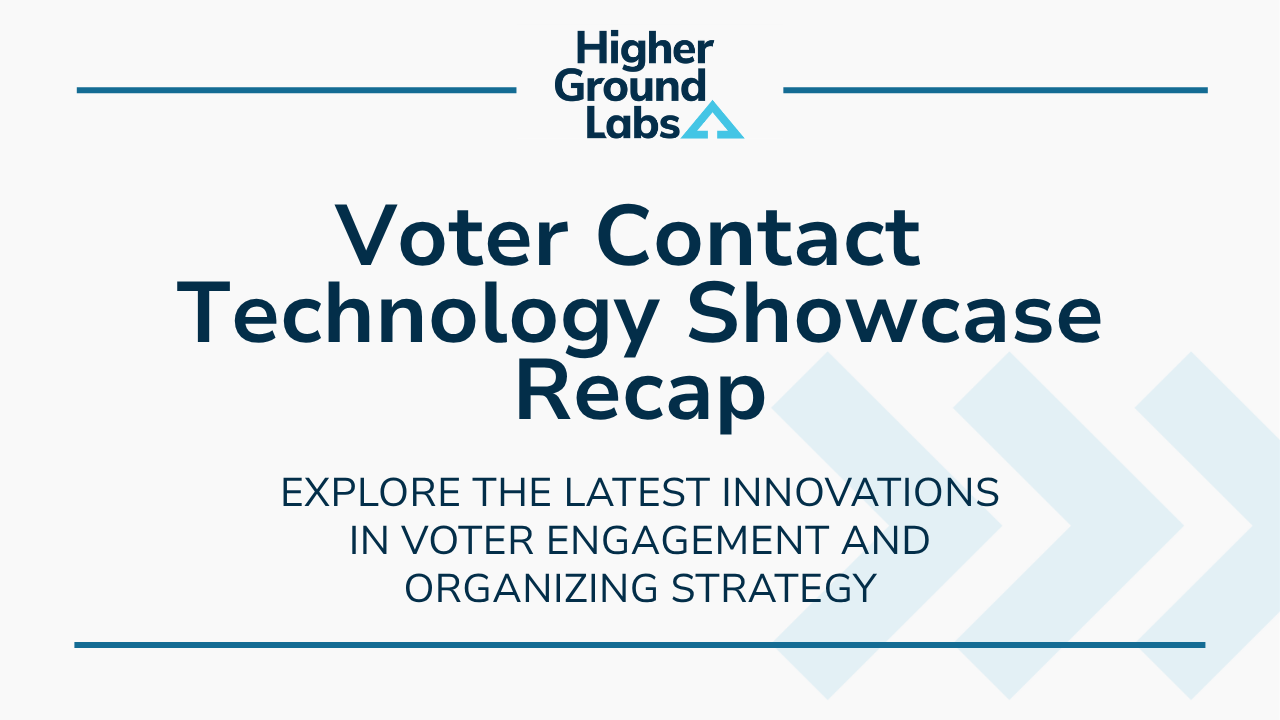Written by: Ben Resnik (Advisor at HGL Progressive AI Lab & Deputy Director of Tech Strategy at Zinc Labs) and Leah Bae (VP of Programs & Partnerships at HGL)
Harnessing new technologies is an indispensable part of gaining an edge in progressive campaigns, organizing, and advocacy. The recent surge in generative AI is poised to — and already is — turbocharging campaign strategies and tactics as we know it.
AI is not at all new. We use many forms of it in our daily lives, whether we are dictating instructions to Siri or translating sentences through Google Translate. We also use it in our work when we buy programmatic ads on Meta or set up automated event reminders on Mobilize.
The newest wave of developments comes from breakthroughs in generative AI, a branch of artificial intelligence technology that can create new content, like text or images, based on patterns it has learned from existing data. From drafting persuasive campaign messages to streamlining data analysis, we are just beginning to scratch the surface of what’s possible through generative AI.
We wrote this guide to equip you with the insights and guidance necessary to safely and effectively navigate tools leveraging generative AI. Below, we highlight the “green flags” of trustworthy traits to look for in vendors as well as the “red flags” to avoid as points of caution. We believe so much is possible through this tech — and we can, and must, do so responsibly.
Green flags: Key trustworthy traits
• Clearly defined, tailored use cases
Look to vendors focusing on specific, narrow use cases customized to your campaign’s needs. Tools designed for particular roles, departments, or tasks — rather than broad-strokes, one-size-fits-all solutions — are often more effective and reliable.
• Transparent data policies
Opt for vendors with transparent data privacy and security policies, especially around ownership. Ensure they respect your data rights and maintain robust security measures. And don’t be afraid to ask them directly how they can and can’t use their customers’ data.
• Human-centric approach
Generative AI cannot and should not operate without people in the loop. Trustworthy vendors know this. Incorporating human evaluation and feedback mechanisms into their AI tools ensures alignment with your campaign’s values, enabling your team to use it safely and ethically.
• Customization, scalability, and integration
Seek tools that allow for customization, scalability to accommodate your campaign’s growth, and seamless integration into your existing tech infrastructure. (Though if they are hooked up to your campaign’s data, it’s even more important to understand their data ownership and security terms!) Additionally, like all other tech, choose vendors that provide robust customer support and training.
• Expertise in AI
Look for vendors with at least one seasoned AI practitioner on their team and/or advisory board. Having this expertise on board helps ensure your vendor will be able to handle your questions and any unexpected complications that come up, and that the tool itself was built with best practices in mind.
Red flags: Points of caution
• Misguided claims on AI’s role
Exercise caution when vendors position AI as a complete replacement for human staff. A genuine AI tool should be seen as a valuable augmentation of human capabilities, not a substitute for expertise and critical thinking.
• Overpromising on efficiency and ROI
Be skeptical when vendors promise unrealistically high-efficiency gains or return on investment. While AI can enhance operations, exaggerated claims may indicate misleading expectations or lack of transparency.
• Opaque data ownership and usage
Request absolute clarity regarding data ownership. Determine whether vendors retain rights to use your inputs and outputs in their training data. Well-defined data ownership agreements are indispensable to safeguard sensitive campaign information.
• Neglecting human oversight
Beware of vendors downplaying the importance of human oversight when using their AI technology. Human evaluation and feedback are essential for ensuring the accuracy and ethical use of AI-generated content.
• Lack of prior AI experience
Vendors lacking significant in-house AI experience may not possess the depth of understanding required to develop robust and effective AI solutions. Seek out teams with experienced AI practitioners or advisors.
HGL’s Progressive AI Lab is committed to facilitating effective and ethical adoption, usage, and awareness of generative AI for progressive campaigns and causes. This is a rapidly developing technology, and while we should evaluate thoroughly and ask critical questions, we also know that when used well AI can be an equalizer and a timesaver that can augment the work of our people. We hope that this guide will serve you in selecting AI tools that best suit your needs while emphasizing responsible and ethical usage.
Political tech companies in the HGL portfolio that are building with AI:
|
Company |
Category |
Application |
|
Research & polling |
With Magnify AI Targeting, Change Research is making custom-modeled targets, previously only available to the largest campaigns and organizations, available to everyone. |
|
|
Content generation |
Helps campaigns increase their content production by keeping campaigns connected to the attention cycle and social graph, and optimizing creative for each member of a campaign audience. |
|
|
Media measurement & messaging testing |
Smart media intelligence delivering customized clips to your inbox. |
|
|
Voter contact & organizing |
As an organizing platform, their latest AI-powered feature parses incoming text messages from voters, and suggests the correct response – saving staff and volunteers countless hours that can be used on other campaign tasks. |
|
|
Media measurement & messaging testing |
Fathom has transformed 25M+ verbatim responses into actionable insights for leading brands and researchers, analyzing open-ended text responses faster and more accurately than ever before. |
|
|
Media measurement & messaging testing |
Identifies which messages or content work best by running Rapid Message Tests. |
|
|
Media measurement & messaging testing |
Effective media measurement and optimization via machine learning models for audience targeting and response analysis. |
|
|
Justice |
AI for criminal justice, using video to text tech. |
|
|
Analytics |
Social media content intelligence & analytics platform that uses AI to understand and optimize content performance. |
|
|
Voter contact & organizing |
Targeted engagement tools + AI campaign strategist that helps improve voter contact for advocacy orgs. |
|
|
Voter contact & organizing |
Deep canvassing tool OpenField uses analytics and automations to help organizers have conversations at scale. |
|
|
Legislative tracking |
With a click of a button, Plural analyzes bill text using AI to find commonalities in other bills across its database of state legislatures and the US Congress. |
|
|
Content generation |
AI copilot that helps Democratic campaigns and allied organizations draft and deploy high quality, effective fundraising content. |
|
|
Content generation |
Writing assistant for social media posts with sharing toolkits for supporters across all platforms. |
|
|
Media measurement & messaging testing |
Measure the impact of political messages and help campaigns optimize messaging strategies. |
|
|
Content moderation |
Context-aware AI to detect harmful content for human content moderators. |



